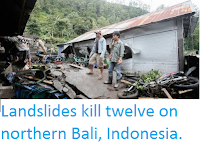Around 34 000 people have been evacuated from the area within 9 km Mount Agung in eastern Bali, following a sharp rise in seismic activity beneath the mountain. Seismic activity beneath volcanoes can be significant, as they are often
caused by the arrival of fresh magma, which may indicate that a volcano
is about to undergo an eruptive episode. Mount Agung last erupted in 1963-4, when it produced ash columns reaching 10 km above its 3 km high summit and lava flows that reached 7 km from the volcano, as well as triggering a series of lahars and pyroclastic flows that killed over 200 people, making people on the island very cautious about any future eruptions.
Mount Agung on Bali, Indonesia. Travel Wires.
The
Indo-Australian Plate, which underlies the Indian Ocean to the south of
Java, Bali and Lombok, is being subducted beneath the Sunda Plate, a
breakaway part of the Eurasian Plate which underlies the islands and
neighbouring Sumatra, along the Sunda Trench, passing under the islands,
where friction between the two plates can cause Earthquakes. As the
Indo-Australian Plate sinks further into the Earth it is partially
melted and some of the melted material rises through the overlying Sunda
Plate as magma, fuelling the volcanoes of Java and neighbouring
islands.
Subduction along the Sunda Trench beneath Java, Bali and Lombok. Earth Observatory of Singapore.
See also...
Follow Sciency Thoughts on Facebook.







